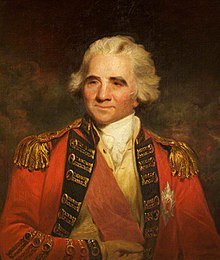‘On the 13th of March 1801, General Sir Ralph Abercrombie, at the head on an army of seventeen thousand men, landed in Egypt, in despite of the most desperate opposition by the enemy. The excellence of the troops was displayed by the extreme gallantry and calmness with which, landing through a heavy surf, they instantly formed and advanced against the enemy. On the 21st of March, a general action took place. The French cavalry attempted to turn the British flank, and made a desperate charge for that purpose, but failed in their attempt, and were driven back with great loss. The French were defeated, and compelled to retreat on Alexandria, under the walls of which they hoped to maintain themselves. But the British suffered an irreparable loss in their lamented commander, Sir Ralph Abercrombie, who was mortally wounded in the course of this action. In this gallant veteran his country long regretted one of the best generals, and one of the worthiest and most amiable men, to whom she ever gave birth.’
Sir Ralph Abercromby was nearly 60 when he came out of retirement to fight the French. Walter Scott covers his death in his “Life of Napoleon Buonaparte”. Along the way on the war trail, in 1797, Abercromby briefly became Governor of Trinidad, which he invaded on behalf of British interests on February 18, 1797.

No comments:
Post a Comment
Note: Only a member of this blog may post a comment.